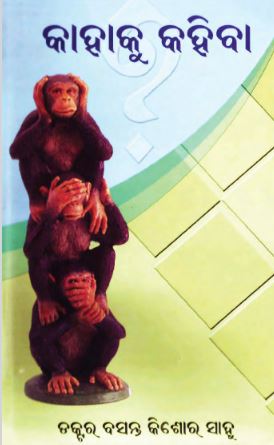Kahaku Kahiba, published in 2011 by the talented Odia poet Basant Kishor Sahu, is a remarkable addition to the landscape of Odia literature. This poetry collection showcases Sahu’s nuanced understanding of human emotions and societal dynamics, articulate enough to resonate with a broad audience. The title translates to “Who Should I Tell?”, reflecting the inner turmoil and existential queries that the poet grapples with throughout the work.
At its heart, “Kahaku Kahiba” navigates the complexities of human relationships, societal expectations, and the poet’s quest for identity. Sahu’s verses are deeply introspective, yet they resonate with universal themes of love, loss, and the search for meaning in an ever-changing world. The poetry does not shy away from addressing the intricacies of life, using vivid imagery and poignant symbolism that invites readers into Sahu’s contemplative space.
One of the most compelling aspects of “Kahaku Kahiba” is its honest portrayal of society and its multifaceted challenges. Sahu skillfully critiques social norms, traditional values, and the often oppressive nature of societal expectations. Through his poetry, he sheds light on issues such as inequality, gender roles, and the complexities of urban life. The poems serve as a mirror reflecting the struggles faced by individuals, providing a voice to the voiceless. Sahu’s unique insights encourage readers to reflect on their roles within society and the impact of their choices on others.
Sahu’s poetry is deeply philosophical, often diving into existential questions that ponder the essence of life itself. In “Kahaku Kahiba,” readers encounter reflections on time, existence, and the quest for truth. Sahu’s contemplative style provokes thought and encourages introspection. His delicate balance between reality and introspection creates a dialogue between the poet and the reader, fostering a sense of shared experience and understanding. This philosophical depth invites readers to reflect on their own lives and the emotional landscapes they navigate.
Unique to Sahu’s work is the integration of contemporary elements that resonate with modern readers. “Kahaku Kahiba” acknowledges the influence of technology, particularly radio, as a means of communication and a source of connection. The poet draws parallels between the intimate act of sharing one’s thoughts on air and the desire for deeper connections in life. The metaphor of radio signals serves as a powerful device, emphasizing the importance of reaching out and being heard in a world where genuine connections are often fleeting. Sahu’s exploration of the radio as a medium reflects the changing dynamics of communication and the longing for authentic expression.
In conclusion, “Kahaku Kahiba” by Basant Kishor Sahu is more than just a collection of poems; it is a profound exploration of human experiences in contemporary society. Through his insightful verses, Sahu invites readers to embark on a journey of self-discovery and reflection. The themes of societal critique, philosophical inquiries, and modern communication resonate throughout the book, making it a significant contribution to Odia literature. Sahu’s ability to weave together personal and societal narratives imbues the poetry with a timeless quality, ensuring that “Kahaku Kahiba” remains relevant for future generations. As readers navigate the emotional landscapes presented in this collection, they find themselves not only reflecting on their own lives but also contemplating their roles within the tapestry of society.
Books Info
| Books name | Kahaku Kahiba |
| Author | Basant Kishor Sahu |
| No Of pages | 82 |
| Publisher | Binapani Sahoo |
| Publication | 2011 |
| Printed At | Bijaya Laxmi |
| Distributor | NA |

